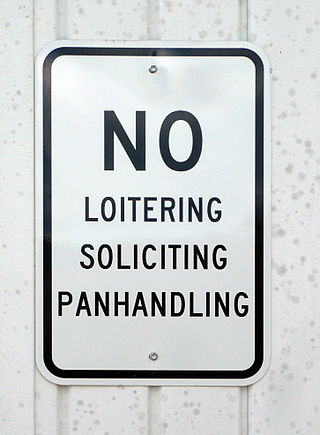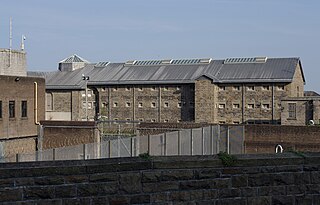
The English Poor Laws were a system of poor relief in England and Wales that developed out of the codification of late-medieval and Tudor-era laws in 1587–1598. The system continued until the modern welfare state emerged in the late 1940s.
Child sex tourism (CST) is tourism for the purpose of engaging in the prostitution of children, which is commercially facilitated child sexual abuse. The definition of child in the United Nations Convention on the Rights of the Child is "every human being below the age of 18 years". Child sex tourism results in both mental and physical consequences for the exploited children, which may include sexually transmitted infections, "drug addiction, pregnancy, malnutrition, social ostracism, and death", according to the State Department of the United States. Child sex tourism, part of the multibillion-dollar global sex tourism industry, is a form of child prostitution within the wider issue of commercial sexual exploitation of children. Child sex tourism victimizes approximately 2 million children around the world. The children who perform as prostitutes in the child sex tourism trade often have been lured or abducted into sexual slavery.

Penology is a subfield of criminology that deals with the philosophy and practice of various societies in their attempts to repress criminal activities, and satisfy public opinion via an appropriate treatment regime for persons convicted of criminal offences.

Penal transportation was the relocation of convicted criminals, or other persons regarded as undesirable, to a distant place, often a colony, for a specified term; later, specifically established penal colonies became their destination. While the prisoners may have been released once the sentences were served, they generally did not have the resources to return home.
A military prison is a prison operated by a military. Military prisons are used variously to house prisoners of war, unlawful combatants, those whose freedom is deemed a national security risk by the military or national authorities, and members of the military found guilty of a serious crime. There are two types: penal and confinement-oriented, where captured enemy combatants are confined for military reasons until hostilities cease. Most militaries have some sort of military police unit operating at the divisional level or below to perform many of the same functions as civilian police, from traffic-control to the arrest of violent offenders and the supervision of detainees and prisoners of war.
In archaic terminology, a footpad is a robber or thief specialising in pedestrian victims. The term was used widely from the 16th century until the 19th century, but gradually fell out of common use. A footpad was considered a low criminal, as opposed to the mounted highwayman who in certain cases might gain fame as well as notoriety. Footpads operated during the Elizabethan era and until the beginning of the 19th century.

Loitering is the act of standing or waiting around idly without apparent purpose in some public places.

The Poor Relief Act 1601 was an Act of the Parliament of England. The Act for the Relief of the Poor 1601, popularly known as the Elizabethan Poor Law, the "43rd Elizabeth", or the "Old Poor Law", was passed in 1601 and created a poor law system for England and Wales.

In English and British history, poor relief refers to government and ecclesiastical action to relieve poverty. Over the centuries, various authorities have needed to decide whose poverty deserves relief and also who should bear the cost of helping the poor. Alongside ever-changing attitudes towards poverty, many methods have been attempted to answer these questions. Since the early 16th century legislation on poverty enacted by the Parliament of England, poor relief has developed from being little more than a systematic means of punishment into a complex system of government-funded support and protection, especially following the creation in the 1940s of the welfare state.

Coldbath Fields Prison, also formerly known as the Middlesex House of Correction and Clerkenwell Gaol and informally known as the Steel, was a prison in the Mount Pleasant area of Clerkenwell, London. Founded in the reign of James I (1603–1625) it was completely rebuilt in 1794 and extended in 1850. It housed prisoners on short sentences of up to two years. Blocks emerged to segregate felons, misdemeanants and vagrants.

The Vagabonds Act 1597 was an Act of the Parliament of England, which aimed to address concerns of vagrancy.

Tothill Fields Bridewell was a prison located in the Westminster area of central London between 1618 and 1884. It was named "Bridewell" after the Bridewell Palace, which during the 16th century had become one of the City of London's most important prisons. Tothill Fields later became the Westminster House of Correction.

Vagrancy is the condition of wandering homelessness without regular employment or income. Vagrants usually live in poverty and support themselves by travelling while engaging in begging, scavenging, or petty theft. In Western countries, vagrancy was historically a crime punishable with forced labor, military service, imprisonment, or confinement to dedicated labor houses.

A prison, also known as a jail, gaol, penitentiary, detention center, correction center, correctional facility, remand center, hoosegow, and slammer, is a facility where people are imprisoned under the authority of the state, generally as punishment for various crimes. Authorities most commonly use prisons within a criminal-justice system: people charged with crimes may be imprisoned until their trial; those who have pled or been found guilty of crimes at trial may be sentenced to a specified period of imprisonment.
Indefinite imprisonment or indeterminate imprisonment is the imposition of a sentence of imprisonment with no definite period of time set during sentencing. It was imposed by certain nations in the past, before the drafting of the United Nations Convention against Torture (CAT). The length of an indefinite imprisonment was determined during imprisonment based on the inmate's conduct. The inmate could have been returned to society or be kept in prison for life.

Crime in New Zealand encompasses criminal law, crime statistics, the nature and characteristics of crime, sentencing, punishment, and public perceptions of crime. New Zealand criminal law has its origins in English criminal law, which was codified into statute by the New Zealand parliament in 1893. Although New Zealand remains a common law jurisdiction, all criminal offences and their penalties are codified in New Zealand statutes.

The prisons in Wales are run by His Majesty's Prison Service, which is in turn a part of HM Prison and Probation Service (HMPPS) which is an executive agency of the Ministry of Justice responsible for the correctional services in England and Wales. The objectives of prison confinement in Wales is threefold: to "hold prisoners securely", to "reduce the risk of prisoners re-offending" and to "provide safe and well-ordered establishments in which we treat prisoners humanely, decently and lawfully".

The Thuggee and Dacoity Suppression Acts, 1836–48 in British India under East India Company rule were a series of legal acts that outlawed thugee—a practice in North and Central India involving robbery and ritualized murder and mutilation on highways—and dacoity, a form of banditry prevalent in the same region, and prescribed punishment for the same.
Prison overcrowding in the United States is a social phenomenon occurring when the demand for space in a U.S. prison exceeds the capacity for prisoners. The issues associated with prison overcrowding are not new, and have been brewing for many years. During the United States' War on Drugs, the states were left responsible for solving the prison overcrowding issue with a limited amount of money. Moreover, federal prison populations may increase if states adhere to federal policies, such as mandatory minimum sentences. On the other hand, the Justice Department provides billions of dollars a year for state and local law enforcement to ensure they follow the policies set forth by the federal government concerning U.S. prisons. Prison overcrowding has affected some states more than others, but overall, the risks of overcrowding are substantial and there are solutions to this problem.

The Vagrancy Act 1898 was a piece of legislation in England and Wales that criminalised men who lived off the earnings of prostitution (pimping) and who solicited in public places. The bill was generally viewed as successful in its impact, leading to the similar Immoral Traffic (Scotland) Act.














